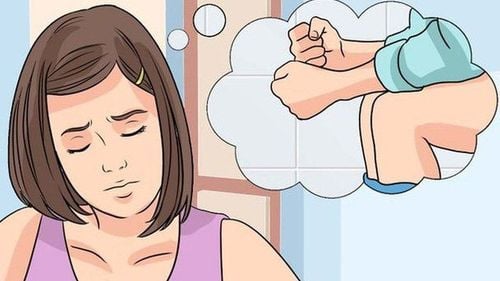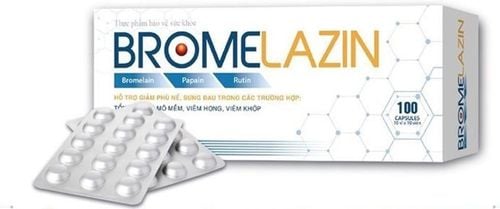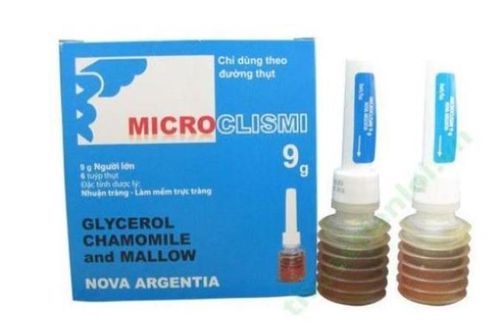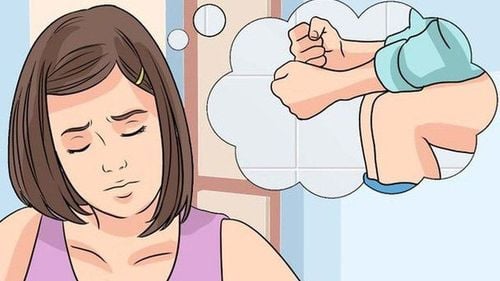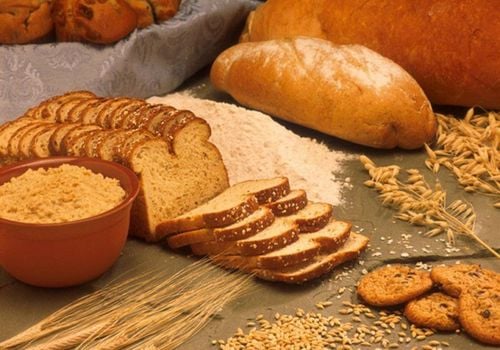This is an automatically translated article.
Posted by Master, Doctor Mai Vien Phuong - Department of Examination & Internal Medicine - Vinmec Central Park International General Hospital
Constipation is one of the possible complications of ulcerative colitis (UC). Ulcerative colitis is an inflammatory bowel disease that causes inflammation along the lining of your large intestine and rectum. Your risk of ulcerative colitis constipation is higher when inflammation occurs in your rectum.
1. What is constipation?
Constipation is defined as fewer than 3 bowel movements per week. The Rome Criteria defines constipation in more detail, with the patient having at least 2 of the following symptoms: bowel movements less than 3 times per week, difficulty in defecation, hard stools, sensation of anorectal obstruction colon, feeling that the bowel is not complete, must use hands to assist during defecation (For example, some patients have to use their hands to remove stools or press on the abdominal wall during defecation).
2. What is ulcerative colitis?
Ulcerative colitis (UC) is a type of inflammatory bowel disease (IBD). IBD includes a group of diseases that affect the gastrointestinal tract. Ulcerative colitis occurs when the lining of the large intestine (also called the colon), the rectum, or both becomes inflamed.
This inflammation creates small sores called ulcers on the lining of your colon. It usually begins in the rectum and spreads upward. It may involve your entire colon.
Inflammation causes the intestines to move quickly and empty the intestines frequently. When the cells on the surface of your gut lining die, sores form. The sores may bleed, discharge mucus and pus.
While this disease affects people of all ages, most people are diagnosed between the ages of 15 and 35. After the age of 50, another small increase in the diagnosis of this disease is seen, usually in men.

3. Ulcerative colitis and constipation
This type of ulcerative colitis is called proctitis. Due to the spasm, the pelvic floor does not relax. This interferes with the normal functioning of the intestines, making it difficult for you to pass stools.
Constipation is stools less than three times a week, straining to have a bowel movement, or hard, pellet-like stools. Here's the problem if you have ulcerative colitis: Not being able to pass stool can cause stomach pain and bloating, further complicating the condition.
Corticosteroids and immunosuppressants are commonly prescribed to treat ulcerative colitis. But even if you take these medications for your condition, you may need other remedies to help control constipation:
Increase your fluid intake
Hydration contributes to gastrointestinal function become healthy. According to a study from 2011, increasing water intake can relieve constipation caused by dehydration that hardens stools.
Try to drink 2 to 3 liters of fluid per day. Drink decaffeinated water or tea. Limit your intake of caffeinated beverages. Caffeine is a diuretic, which can cause dehydration.
Take stool softeners
Stool softeners, also known as laxatives, increase the volume of your stool. This can make it easier for them to get through. Take these laxatives as directed with 2 to 3 liters of liquid, preferably water or juice.
Talk to your doctor before combining a stool softener with prescription medication.
You should stop taking this laxative if you experience side effects such as:
Abdominal pain Vomiting Nausea Taking osmotic laxatives
Doctors usually recommend osmotic laxatives as a line of defense Follow-up procedure if constipation does not improve with stool disintegrating agents. This type of laxative stimulates bowel movements by increasing the amount of water in your intestines, which helps soften stools. This is a slow-acting laxative, so you should have a bowel movement within two to three days. This laxative may be safer than other laxatives because there is less risk of developing side effects, such as:
Bloating Abdominal cramps Bloating

Eat more fiber
Increase the amount of fiber in your diet to ease symptoms However, be aware that too much fiber can worsen the symptoms of IBD in some people. People.
It can be helpful to keep a food diary to identify potentially problematic foods. For example, your body may tolerate some fruits but not others. Or you may experience worse symptoms after eating broccoli or cabbage, but other vegetables shouldn't be a problem.
The recommended amount of fiber is 20 to 35 grams per day. Increase fiber intake slowly and let your body adjust. High-fiber foods include:
Vegetables Fruits Grains If raw fruits and vegetables irritate your colitis, steam or bake these foods and monitor your symptoms.
Talk to your doctor about fiber supplements if your constipation doesn't improve.
Participating in regular physical activity
Reduced physical activity may also play a role in ulcerative colitis constipation. A sedentary lifestyle slows down digestion and intestinal contractions. This makes it harder for stool to pass through your intestinal tract.
Increase your physical activity level to see if constipation improves. Start with low to moderate intensity exercises, then gradually increase the intensity as your endurance improves.
Walk or swim, cycle or participate in exciting sports. The American Heart Association recommends 150 minutes of exercise per week, which equates to 30 minutes for five days or 40 minutes for four days.
4. Ask your doctor about biofeedback
Ask your doctor about biofeedback if you can't resolve your ulcerative colitis constipation on your own. This type of behavioral therapy can improve bowel function. It re-trains the pelvic floor muscles through relaxation techniques, which in turn can stimulate bowel movements. In a study of 63 people with chronic constipation, all participants reported significantly more weekly bowel movements with adaptive biofeedback therapy. Use biofeedback in combination with other types of ulcerative colitis therapies and remedies, such as:A prescription medication Increase fluid intake Physical activity Follow your recommendations your behavioral therapist for best results.
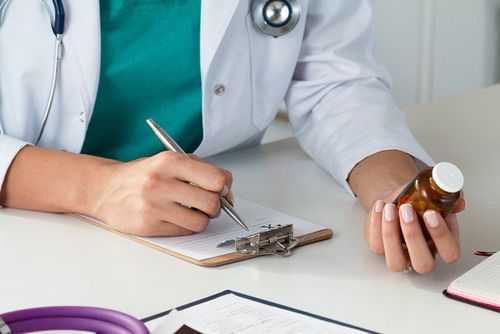
Constipation with ulcerative colitis can cause abdominal pain and bloating, which can worsen your condition. Don't ignore persistent constipation. If left untreated, constipation can cause a serious complication called toxic megacolon. If these remedies don't help you manage your ulcerative colitis constipation, talk to your doctor.
Currently, Vinmec Times City International Hospital is applying a treatment method for cases of constipation due to a decrease or loss of defecation reflex by anal electrical stimulation combined with interference waves, biofeedback episode. study (Biofeedback). The above method has helped > 80% of patients to recover the defecation reflex, improve bowel motility and the process of excreting stool, helping to improve constipation.
Depending on the patient's constipation, the doctor will appoint the necessary investigations such as: colonoscopy with contrast, anorectal pressure measurement, assessment of bowel function and pathologies. related to the pelvic floor... to find the cause, thereby giving the optimal treatment regimen. Hundreds of patients of different ages have achieved the desired treatment results. The most important criterion to evaluate the success of treatment is that the patient has regular bowel movements every day, bowel movements are easier,...
Please dial HOTLINE for more information or register for an appointment HERE. Download MyVinmec app to make appointments faster and to manage your bookings easily.
ReferencesCollins, P., & Rhodes, J. (2006, August 12). Ulcerative colitis: Diagnosis and management. British Medical Journal, 333 (7563), 340-343 ncbi.nlm.nih.gov/pmc/articles/PMC1539087/ Hanauer, S. B., Present, D. H., & Rubin., D. T. (2009, June). Emerging issues in ulcerative colitis and ulcerative proctitis: Individualizing treatment to maximize outcomes. Gastroenterology and Hepatology, 5 (6 Suppl 15), 4-16 ncbi.nlm.nih.gov/pmc/articles/PMC2886411/ Mayo Clinic Staff. (2014, September 9). Ulcerative colitis: Lifestyle and home remedies mayoclinic.org/diseases-conditions/ulcerative-colitis/basics/lifestyle-home-remedies/con-20043763 Popkin, B. M., D'Anci, K. E., & Rosenberg, I. H. (2010, August). Water, hydration, and health. Nutrition Reviews, 68 (8), 439-458 ncbi.nlm.nih.gov/pmc/articles/PMC2908954/ Portalatin, M., & Winstead, N. (2012 March). Medical management of constipation. Clinics in Colon and Rectum Surgery, 25 (1), 12-19 ncbi.nlm.nih.gov/pmc/articles/PMC3348737/.





